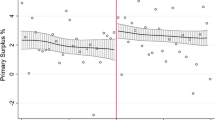Abstract
One line of research finds the size of the deficit to be positively correlated with the number of political actors. This ‘political fragmentation’ hypothesis has been tested on OECD countries. We successfully replicate Volkerink and de Haan’s (Public Choice 109:221–242, 2001) model on an OECD sample. However, when we add ten non-OECD countries, the effect of political fragmentation disappears. We argue that the importance of political fragmentation varies according to the institutionalization of political systems. When we interact the age of a democracy with political fragmentation, we find that legislative fractionalisation increases the budget deficit as a democracy becomes more institutionalised.
Similar content being viewed by others
References
Acemoglu, D., & Robinson, J. A. (2006). Economic origins of dictatorship and democracy. Cambridge: Cambridge University Press.
Alesina, A., & Perotti, R. (1999). Budget deficits and budget institutions. In J. Poterba & J. Von Hagen (Eds.), Fiscal institutions and fiscal performance (pp. 13–36). Chicago: University of Chicago Press.
Alt, J. (2002). Comparative political economy: credibility, accountability, and institutions. In I. Katznelson & H. Milner (Eds.), Political science: the state of the discipline (pp. 147–171). New York: WW Norton and Co.
Arellano, M., & Bond, S. (1991). Some test of specification for panel data: Monte Carlo evidence and an application to employment equations. The Review of Economic Studies, 58, 277–297.
Beck, T., Clarke, G., Groff, A., Keefer, P., & Walsh, P. (2001). New tools in comparative political economy: The Database of Political Institutions. World Bank Economic Review, 15, 165–176.
Barro, R. (1979). On the determination of public debt. Journal of Political Economy, 87, 940–971.
Cameron, D. (1978). The expansion of the public economy: a comparative analysis. American Political Science Review, 72, 1203–1261.
Clague, C., Keefer, P., Knack, S., & Olson, M. (1996). Property and contract rights in autocracies and democracies. Journal of Economic Growth, 1, 243–276.
Crain, W. M., & Muris, T. E. (1995). Legislative organization of fiscal policy. Journal of Law and Economics, 38, 311–333.
de Haan, J., & Sturm, J.-E. (1997). Political and economic determinants of OECD budget deficits and government expenditures: a reinvestigation. European Journal of Political Economy, 13, 739–750.
de Haan, J., Sturm, J.-E., & Beekhuis, G. (1999). The weak government thesis: Some new evidence. Public Choice, 101, 163–176.
Freedom House (2005). Freedom in the world 2005: the annual survey of political rights and civil liberties. Totowa: Rowman & Littlefield.
Goode, R. (1984). Government finance in developing countries. Washington, DC: Brookings.
Hallerburg, M., & Von Hagen, J. (1999). Electoral institutions, cabinet negotiations, and budget deficits in the European Union. In J. M. Poterba & J. Von Hagen (Eds.), Fiscal institutions and fiscal performance (pp. 209–232). Chicago: University of Chicago Press.
Helmke, G., & Levitsky, S. (2004). Informal institutions and comparative politics: a research agenda. Perspectives on Politics, 2, 725–740.
Jones, M., Sanguinetti, P., & Tommasi, M. (2000). Politics, institutions and fiscal performance in a federal system: an analysis of Argentine provinces. Journal of Development Economics, 61, 305–333.
Keefer, P. (2005). Democratization and clientelism: why are young democracies so badly governed? Policy Research Paper 3594. Washington, DC: World Bank.
Kontopolous, Y., & Perotti, R. (1999). Government fragmentation and fiscal policy outcomes: evidence from OECD countries. In J. M. Poterba & J. Von Hagen (Eds.), Fiscal institutions and fiscal performance (pp. 81–102). Chicago: University of Chicago Press.
Perotti, R., & Kontopolous, Y. (2002). Fragmented fiscal policy. Journal of Public Economics, 82, 191–222.
Persson, T., & Tabellini, G. (2003). The economic effects of constitutions. Cambridge, MA: Massachusetts Institute of Technology Press.
Przeworski, A., Alvarez, M. E., Cheibub, J. E., & Limongi, F. (2000). Democracy and development. Political institutions and well-being in the world, 1950–1990. Cambridge: Cambridge University Press.
Rae, D. (1971). The political consequences of electoral laws. New Haven: Yale University Press.
Rodrik, D. (1998). Why do more open economies have bigger governments? Journal of Political Economy, 106, 997–1032.
Roubini, N., & Sachs, J. (1989). Government spending and budget deficits in the industrial countries. Economic Policy, 8, 99–132.
Stein, E., Talvi, E., & Grisanti, A. (1999). Institutional arrangements and fiscal performance: The Latin American experience. In J. M. Poterba & J. Von Hagen (Eds.), Fiscal institutions and fiscal performance (pp. 103–133). Chicago: University of Chicago Press.
Velasco, A. (2000). Debts and deficits with fragmented fiscal policy making. Journal of Public Economics, 76, 105–125.
Volkerink, B., & de Haan, J. (2001). Fragmented government effects on fiscal policy: new evidence. Public Choice, 109, 221–242.
Woldendorp, J., Keman, H., & Budge, I. (1993). Special issue: political data 1945–1990: party government in twenty democracies. European Journal of Political Research, 24.
Woldendorp, J., Keman, H., & Budge, I. (1998). Party government in twenty democracies: an update (1990–1995). European Journal of Political Research, 33, 125–164.
Woo, J. (2003). Economic, political and institutional determinants of public deficits. Journal of Public Economics, 87, 387–426.
Author information
Authors and Affiliations
Corresponding author
Rights and permissions
About this article
Cite this article
Elgie, R., McMenamin, I. Political fragmentation, fiscal deficits and political institutionalisation. Public Choice 136, 255–267 (2008). https://doi.org/10.1007/s11127-008-9294-x
Received:
Accepted:
Published:
Issue Date:
DOI: https://doi.org/10.1007/s11127-008-9294-x




